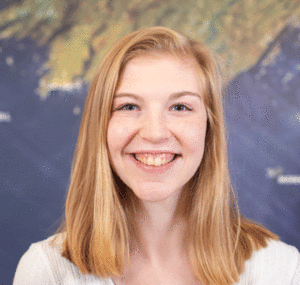Reflections is written by Island Fellows, recent college grads who do community service work on Maine islands and in coastal communities through the Island Institute, publisher of The Working Waterfront.
When my fellowship began a year ago, I’ll admit I was a bit lost. My host organization, the Downeast Institute (DEI), had applied for a fellow before the pandemic. At that time, its facility was open for public tours, visiting scientists were scheduled to conduct innovative research in marine science and aquaculture, and hundreds of students from primarily K-8 schools throughout Washington County were trampling in and out of the Education Center weekly.
Upon my arrival last September, that version of DEI was foreign to me. Without all the hustle and bustle, I worried that I wouldn’t find my own special place at the institute. I was concerned that the position envisioned for me had vanished, which was somewhat true.
I was, however, able to find my niche this past year. While I haven’t exactly been doing the work I originally came to do, I believe what I have accomplished has been even more meaningful and timely.
Never was I more pleased than when … students and school staff began recognizing and greeting me in public.
I’ve been in the business of building connections, which has arguably never been more critical. I’ve built trust and respect among DEI’s small group of some 15 employees by being open and willing, and saying “yes” to as many collaborations and opportunities as possible.

It was also important to me that I develop connections in the local Jonesport-Beals community, formally, by volunteering at the Beals Heritage Center and Peabody Memorial Library, and informally, by befriending strangers in places as random as the auto repair shop. Never was I more pleased than when, only a few short months into my fellowship and bundled up with a face mask and thick winter coat, students and school staff began recognizing and greeting me in public.
I helped strengthen connections within and between the fishing and scientific communities along the Maine coast through my work at DEI on Dr. Brian Beal’s clam recruitment monitoring network and in the creation of informative shellfish management videos. I’ve even grown friendship connections through my fellowship-supported participation in the Maine Environmental Education Association’s changemakers network, and with the other Downeast Island Fellows during in-person “mini-retreats” and weekly “peer coaching” calls.
Strong connections are the cornerstone of small, rural communities like Jonesport-Beals and of growing non-profit organizations like DEI. Through long winters, changes in local industries and economies, population aging and loss, and a pandemic, this unique corner of the world still has an abundance of dedication to place and to each other. To me that’s beautiful and it’s something we should all emulate.
One year into my fellowship, I can confidently say that I have found my place. It’s been a year of simultaneous constants and change, and one of tremendous personal and professional growth. The best part of being an Island Fellow is that I’ve had the opportunity to assist with a wide variety of projects, from education programming and public outreach to research projects in the field and lab.
The experience of working on “a little bit of everything” has helped me better understand the types of work I enjoy doing and want to pursue in the future. The experience of living year-round in a remote community has shown me how creative and resilient I am.
I even (somewhat) look the part of a Downeast Mainer now. I can walk out on a mudflat in hip-waders without falling down. I’ve invested greatly in Carhartt clothing. My co-workers have taught me regional slang (e.g. the phrase “stove up”), and I’ve caught myself letting a “yessah” slip out from time to time. I’m proud of the work I’ve done and how I’ve grown, and I’m thrilled to discover what connections I’ll create in my second fellowship year.
Hannah Greene graduated from Wheaton College in 2020 with a B.A. in environmental science and double minors in public policy and public health studies. She is based on Beals Island working with the Downeast Institute on educational community research projects.





